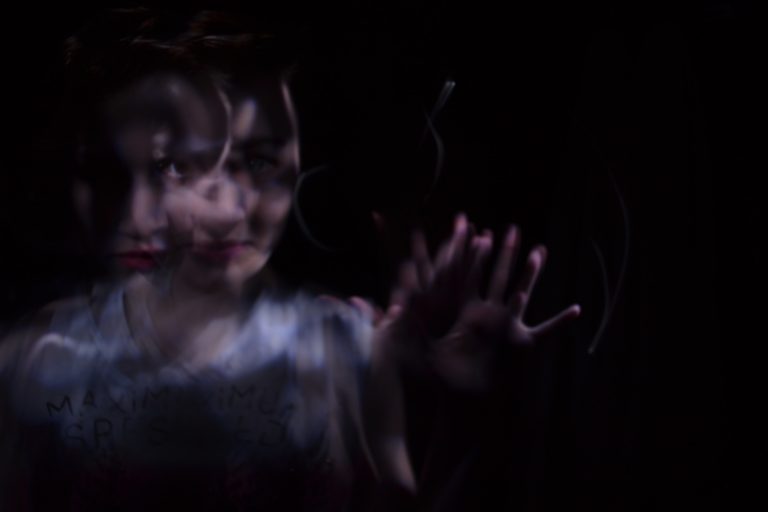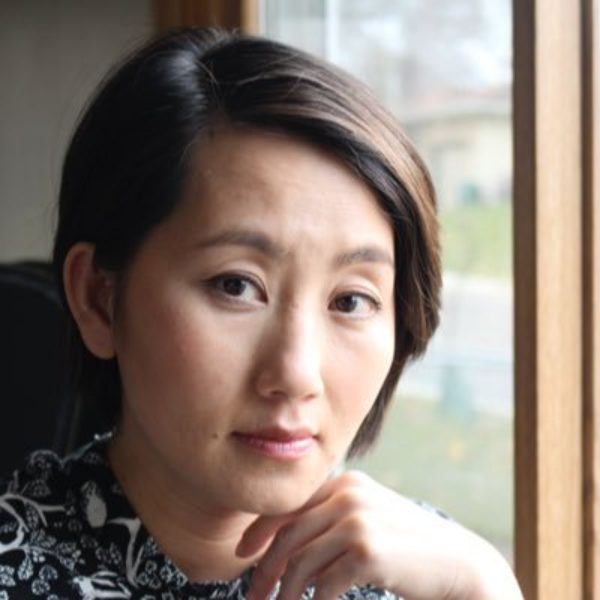
Image by Mar Newhall/Unsplash, Public Domain Dedication (CC0).
Two Hauntings
The house was a small 1.5-story home built in the 1940s. It was in a quiet neighborhood full of old trees close to Como Lake. The house, despite its cuteness and nice location, had been relegated as Section 8 housing. We were newcomers to America. We were low-income. The little two-bedroom, one-bath, government-subsidized house worked for us.
It was autumn time. I was approaching my 12th year. That fall, our first fall in the house, the big tree in the backyard let down its brown leaves and piles of fallen leaves were blown by the wind into all corners of the fenced yard. My siblings and I raked the leaves into high piles and jumped into them, heedless of our allergies.
Our move into the house came at a busy time in our life. Our mother and father both worked the second shift. During the day, they took care of the younger children while my sister and I went to school. Right after school, we replaced them as caretakers and our parents made their way in the used Subaru that coughed great spurts of cloud from its exhaust to the factory in Eden Prairie. They did not get home until well beyond midnight. We were each doing the work of surviving in America. There were no rooms for complaints or exhaustion in the tiny house.
Part of my job was to give the three younger children their evening bath. My older sister used that time to prepare dinner in the little kitchen with its closed door. She made simple broccoli-and-chicken stir-fry, Polish sausage with onions and tomatoes, or hot dogs, or instant noodles. She cooked quietly and efficiently. We never heard her movements in the kitchen, the shifting of pots and pans. We knew that dinner would be ready when we were done with the bath.
The bathroom in the house was tight. A bathtub lined one wall. On the opposite side, a toilet, a metal trash can beside the small sink. There was a single window between the bathtub and the toilet. The window had a screen on it. It was about six feet off the ground. There was enough square area in the room for an old rug my mother washed and rewashed every weekend.
Each night that autumn, I drew my siblings their bath. I unclothed them and sat them in the warm water. When we had bubbles, they bathed in white foam. When we didn’t, more often than not, they sat playing with plastic cups. Our habit was for me to wash them, the youngest to the oldest. Then, I’d leave them to play in the bath while I gathered clean clothing as quickly as I could.
When I ran back into the bathroom, worried about the youngest, the children often had leaves from the big tree in the backyard floating in the water with them.
“What are those leaves doing in the bath?”
Xue, the oldest, said, “Didn’t you come and put them in here for us?”
“How could I do that?” I grabbed the leaves as quickly as I could out of the bath.
I squeezed them in my hands before I threw them out into the metal trash can.
I was a mere 4-foot-7 then. It was hard enough for me to get the glass pane up, to open that window. To my knowledge, the screen did not come out. How could my arms reach six feet down to the ground to gather fallen leaves? Or reach how many feet up to get the leaves still clinging to the tree? I looked around the small bathroom. Nothing. The door to the hallway was in shadows despite the fact that the single light in the small area was on.
Xue shrugged.
Hlub added, “Xue is not lying. You came in, your hair in your face, and you did that for us to play with.”
I took the children out of the bath, one at a time. I dried them, their feet on the rug. We pretend we are on a boat. The ocean was so big. “Be careful, be careful, so you don’t fall off,” we say to each other. The children giggled and I kept them close. I dressed them one by one, then we all left the bathroom, its smell wet, not like fresh rain, but like some dampened well from long ago. I was afraid to look back once the light in the bathroom was off. I brushed away the feeling that something, someone, stood in the wash of the shadows, looking, laughing, hair in its face, long arms dangling by her side, waiting patiently, playing us gently.

On the weekends when my mother and father did not do overtime, we visited our cousins. They, too, lived in Section 8 housing. Theirs was a bigger house, much older than our own. The brown two-story was on the west side of St. Paul. Its best feature was a cement pond in the shape of a peanut. My boy cousins had successfully raised sunfish in it, feeding the brown fish broken bits of cooked rice, occasionally moldy bread, and once in a while: popcorn. I loved our visits to their house but only because it was always full of people when we were there.
The house was dark. There was a porch. While the porch had lots of windows, it was full of stuff, so no one really lived in it. Inside the house, there were square-shaped stained-glass windows high up by the ceilings, a fine row of them. When the sun came through them, colorful squares and triangles played on the worn wooden floor. When the sun did not, the house was cloaked in cool shadows. In the dining room, there was an old light fixture that hung from the ceiling. The chain was rusted but the bulbs did their work, reflecting like watery suns from the old mirror alongside the built-in buffet. All the light in the house felt weak.
One of my older cousins was having bad nightmares in her little bedroom tucked beneath the eaves of the house. She was scared, so much so that her parents had called in celebrated shamans and they had tied red strings to her ankles and her wrists, to bless her and protect her in her moments of fear. One particularly powerful shaman had even brought in a Hmong knife and asked his spirits to stay with her through the long nights. My cousin could only whisper of her nightmares outside the house in the yard, beside the peanut pond.
The nightmare: My cousin wakes up in her room, night after night. The little closet door at the foot of her bed opens. A shadowy girl emerges. She smiles at my cousin, a gruesome smile, full of rotting teeth and falling maggots. My cousin is never sure if she’s in a dream or if its real life.
The maggot girl whispers, “You think I’d be scared of that sword the shaman has placed beneath your pillow?”
My cousin is too frightened to answer. She frantically pulls at her pillows, tries to feel for the big Hmong knife, tied with a piece of red cloth, magic cloth that the shaman had sealed his chants in. Her fingers meet cool sheets.
The maggot girl laughs. The room resonates with her laughter. Her long, thin fingers, their tips black, stretch into the dark, point to the foot of my cousin’s bed. Somehow the magic sword, meant to protect her, is on the floor, its red cloth like dark blood seeping from its handle, closer to the maggot girl than my cousin.
They both make slow moves toward the sword. My cousin is at the foot of her bed. She can smell the maggot girl, a stench like deep, dark earth, cool and close. My cousin refuses to look. She does not want to know who will make it to the big knife first. She reaches her right hand, her fast hand, for the knife. A coldness folds around her hand. She jerks her hand so hard, she wakes, sweating cold sweat, smelling the musty odor from the open closet.
I loved my cousin. I loved myself. I loved my siblings. I wished desperately that we could all move to the happy, sunny homes that we saw in other parts of the city. But we could not move. My mother and father did not have enough money. My aunt and my uncle did not have enough money. We were all stuck in our love for each other, in our fears of the scary worlds waiting for us.
At school, we told no one of the ghosts and the hauntings that went on in our homes. We were already strange new kids, from far across the globe, and there was no room for us to make others warier of us, to speak of our fears, so we held on through autumn, through winter, through spring, into hot summer when we could spill forth from our houses and be with each other outside beneath the bright, warm, open sunshine.


